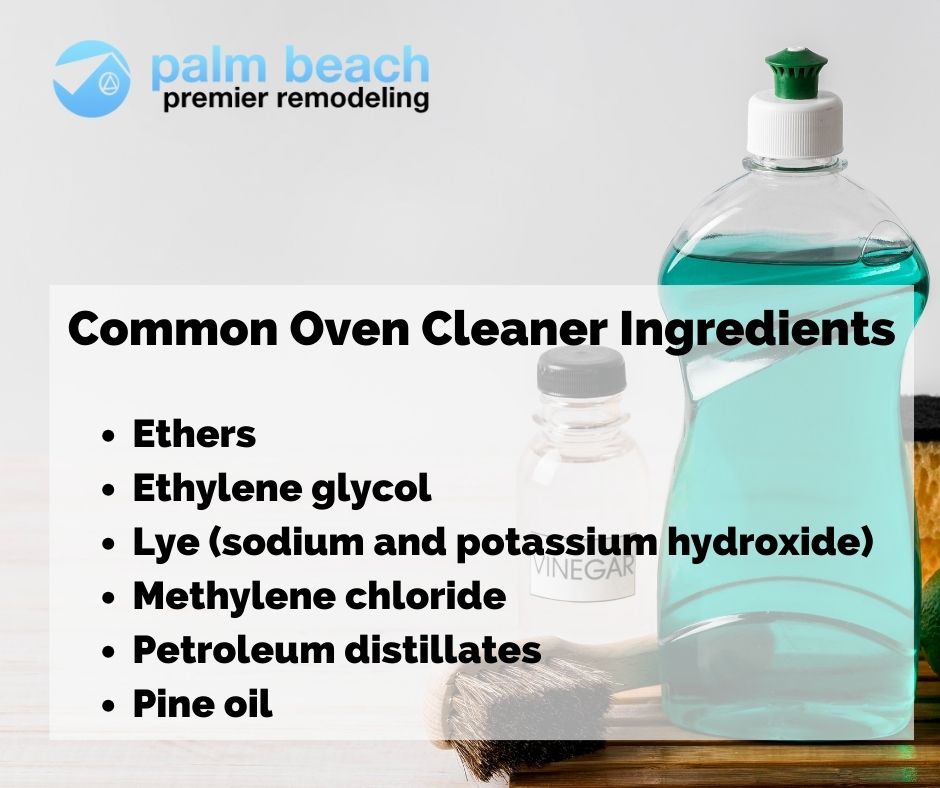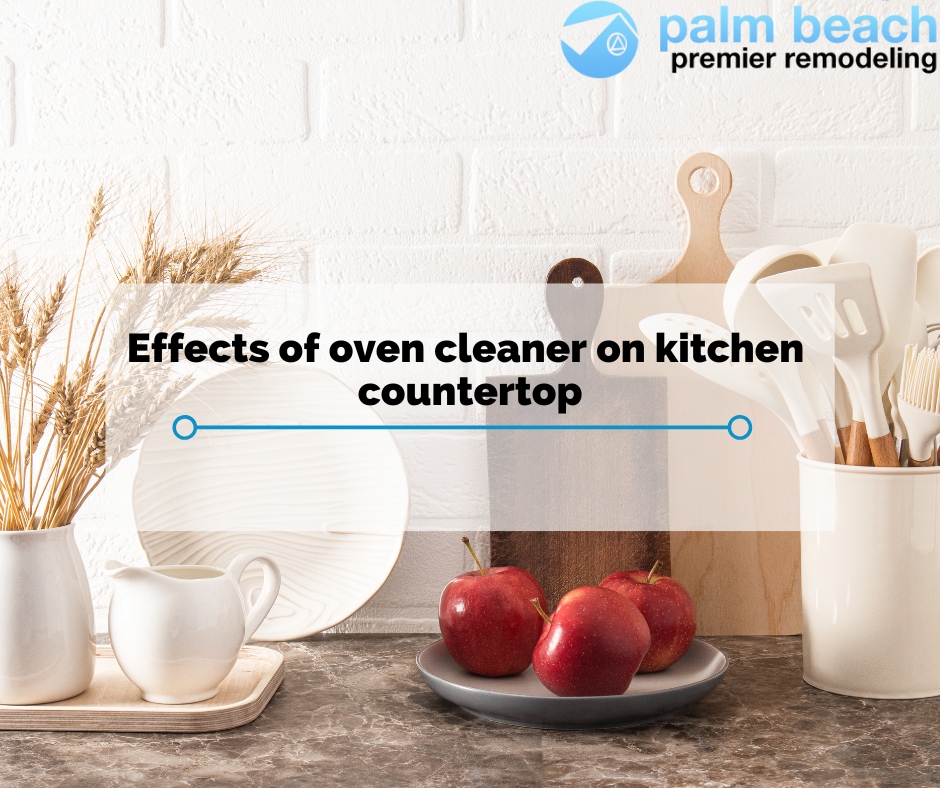The effects of oven cleaners on kitchen countertops can be significant, given the potential chemical reactions between the cleaner and the countertop material. Kitchen countertops are subject to various cleaning agents, including oven cleaners, which are designed to remove tough stains and grease buildup.
However, the chemical composition of oven cleaners and their interactions with different countertop materials can lead to various effects, ranging from minor discoloration to structural damage. Depending on the materials used in the countertop’s construction, such as granite, marble, laminate, or stainless steel, the cleaner may react differently, leading to distinct outcomes.
How do Oven Cleaners React with Various Countertop Materials?
The use of oven cleaner on kitchen countertops poses significant risks to both the surface material and human health. These cleaners contain potent ingredients such as sodium hydroxide, butane, and turpentine, which can react with various countertop materials, leading to corrosion, discoloration, and loss of finish. Stone countertops like granite, marble, and quartz are particularly susceptible to damage, while laminate countertops may fade and lose color. Wooden countertops are at high risk due to the softening and dissolution of varnish coatings.
So while many oven cleaners and abrasive cleaners are known for their powerful cleaning capabilities they can react badly with your kitchen countertop. This means that your once-pristine countertop could become a shadow of its former self.
Let’s explore the interaction of oven cleaners with specific countertop materials.
1. Granite Countertops
Oven cleaners containing harsh chemicals, such as sodium hydroxide, can break down the protective sealant on these granite countertops. This leaves the stone vulnerable to absorbing liquids, which can lead to staining. In contrast, stainless steel countertops are known for their resistance to such chemicals.
In some cases, the use of oven cleaner on granite may result in discoloration and spotting, and in some unfortunate instances, the color damage may be irreversible. So, while granite may be more resistant to tarnishing from oven cleaners when compared to manufactured stones like quartz, it is still prone to damage over time.
2. Quartz Countertops
Being a man-made material, the resin binders in a quartz countertop can be degraded when exposed to the harsh chemicals found in oven cleaners. This degradation leads to increased porosity, making quartz more prone to staining.
Oven cleaner can lead to discoloration of quartz countertops, manifesting as stains, blotches, or streaks. Therefore, quartz countertops face a high risk of both aesthetic and physical damage when in contact with the caustic substances in oven cleaners.
3. Marble Countertops
Marble countertops can suffer damage when exposed to oven cleaners. These cleaners can damage the protective coating and shine of the marble surface upon contact.
With prolonged use, oven cleaners can have damaging effects on marble countertops, including:
- Wearing down the sealant leads to discoloration and an uneven surface
- Etching the marble, resulting in loss of shine and protective layers
- Potentially causing permanent discoloration
It is important to avoid using oven cleaners on marble countertops to preserve their appearance and longevity.
Alternative cleaning methods like warm water and mild dish soap are safer and more effective for maintaining marble countertops.
4. Other Natural Stone Counters
Other types of natural stone countertops, such as limestone and travertine, should also be handled with care. Using oven cleaners on limestone and travertine countertops can lead to significant damage, including corrosion, discoloration, fading, and etching of the surface. The powerful and corrosive chemicals in oven cleaners can react with the stone, causing irreversible harm to its appearance and structural integrity.
Specialized stone sealers can reduce the porosity of these countertops, thereby enhancing stain resistance and making them less susceptible to etching. Moreover, using pH-neutral cleaners is recommended to avoid damaging the stone’s etching surface.
5. Laminate and Wood Countertops
Oven cleaners can cause laminate counters to fade and lose color and finish, demanding the use of gentle cleaning methods.
For laminate countertops, oven cleaners can cause fading and loss of color and finish, making it not worth the risk. Similarly, wood countertops are susceptible to damage from oven cleaners, resulting in the softening and dissolution of the protective coating, potentially leading to permanent stains, holes, and structural weakness.
It’s recommended to avoid using oven cleaners on both laminate and wood countertops and instead opt for gentler cleaning methods using warm, soapy water or approved cleaners to maintain their appearance and integrity.
Why Not Use an Oven Cleaner on Countertops?
Using oven cleaner on kitchen countertops is not recommended due to its powerful, toxic, and corrosive nature. The chemicals in oven cleaners can lead to corrosion, fading, discoloration, or deterioration of the countertop material, posing risks to both the surface and human health.
Moreover, the use of oven cleaners on countertops can have adverse effects on indoor air quality due to the fumes emitted by the toxic chemicals. Continuous exposure to these fumes may pose health risks to individuals, emphasizing the importance of using safer alternatives for cleaning countertops.
In cases where kitchen countertops have already sustained damage from oven cleaners, it’s advisable to contact a professional contractor for a repair quote.

Understanding Oven Cleaner Ingredients
To grasp the damaging potential of oven cleaners, we need to examine their ingredients. Oven cleaners typically contain hazardous ingredients such as:
- Ethers
- Ethylene glycol
- Lye (sodium and potassium hydroxide)
- Methylene chloride
- Petroleum distillates
- Pine oil
All of these ingredients are corrosive to kitchen countertops.
Moreover, chemicals such as turpentine or butane in oven cleaners are particularly harmful to humans if consumed, rendering them unsuitable for use on surfaces involved in food preparation. Contact with these chemicals can lead to burns on the skin and eyes, and inhaling them can pose a significant risk to the respiratory system.
What are Some Alternative Cleaning Solutions for Kitchen Countertops?
Most countertop materials can be safely cleaned daily with a moist cloth and mild dish soap, and dried with microfiber cleaning cloths. Using a cleaner on kitchen countertops that is gentle and non-abrasive will ensure their longevity and maintain their appearance.
For specific tough stains, wooden countertops can be cleaned using kosher salt and half a lemon, while a paste of baking soda and warm water can be used for light scrubbing on other materials, taking care not to damage any sealants. For natural stones like granite and marble, using cleaning kits designed for the specific stone type is recommended.
Preventative Measures and Best Practices
To maintain the beauty and longevity of your countertops, adopt preventative measures and best practices. Clean spills immediately using a soft sponge or microfiber cloth. Rinse the surface thoroughly and dry with a clean towel to avoid water spots. Use mild dish soap and water for nonporous surfaces like granite or quartz.
Protect heat-sensitive countertops with trivets or hot pads and use cutting boards to prevent scratches. To remove stubborn stains, use specialized techniques like lemon and salt for wood or mild abrasives like baking soda for marble and granite. Follow manufacturer recommendations for sealing or conditioning. Develop a cleaning routine based on material and usage.
What Is the Best Thing to Clean Kitchen Counters With?
The best thing to clean kitchen counters with is a mild, non-chemical liquid detergent and water, using a clean cotton cloth. It is important to avoid harsh products with acid or alkali as well as steel wool or scouring pads because some counter top materials do not react well with these products.
Can I Use Easy-Off on Granite Countertops?
No, it is not advised to use Easy-Off on granite countertops because it may strip off the sealant layer and tarnish the stone. Be cautious about using harsh chemicals on granite.

